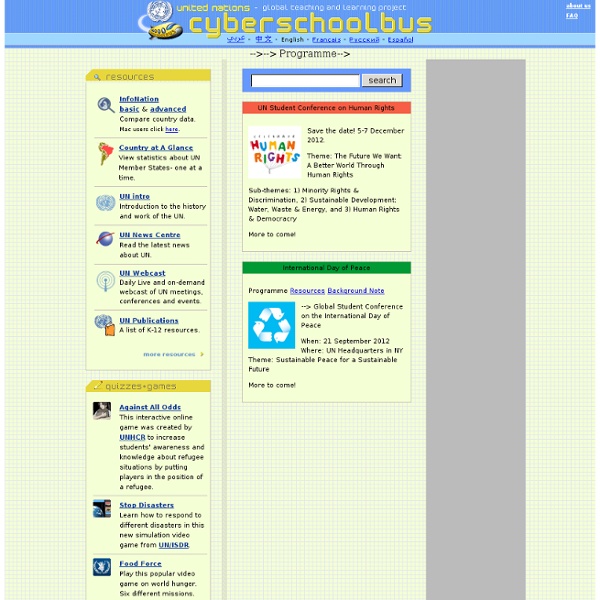



http://www.un.org/Pubs/CyberSchoolBus/
SLN Geography Home Page Welcome from the Staffordshire teachers of Geography Whether you are interested in primary, middle or secondary education, we hope you will find something useful and enriching. You will not regret it! Geography teachers are welcome to join in, wherever you come from in the world (and indeed you do!) This site was started by Chris Durbin and Kate Russell, former Geography Advisers at Staffordshire County Council, with invaluable support from Andy Holt and Mark Gee. America's History in the Making — Historical Thinking Skills Interactives This series of interactive activities introduces and models the Historical Thinking Skills defined by the National Center for History in the Schools. The interactives each model a specific skill or set of skills, such as analyzing historical artifacts or using primary sources to develop a thesis. The first five interactives conclude with "Classroom Extensions," which give teachers hints on how they can teach using these skills in their classrooms. The final interactive, Balancing Sources, includes input from our advisory board of teachers, modeling how they might use the primary sources within the interactive. These interactives require that cookies and JavaScript be enabled in your browser. Internet Explorer on Macintosh is not supported at this time.
Free Campaigns Resources Anti-Slavery International has a range of free resources and materials available for activists and supporters to help you raise awareness of slavery, and to support your events and activities. The following are available: Cotton Crimes campaign action cards and badgesSlavery-Free London campaign action cards and briefingAnti-Slavery International Freedom Fighter leafletFactsheets on slavery; Trafficking in the UK, Slavery and what we buy, Domestic Work, Slavery past and present, Child labour, Bonder labour, and What was the Transatlantic Slave Trade?
Juicy Geography What Makes Educational Games Work? Teaching Strategies As the gaming in education continues to grow, one of the foremost experts in the field, Constance Steinkuehler, makes the case for why it’s important to pay attention to what works in gaming and how it could be applied to learning. At the recent Aspen Ideas Festival, Steinkuehler, who’s now a Senior Policy Analyst at the Office of Science and Technology Policy in the Executive Office of the President, spoke with author and researcher John Seely Brown about some of the more prominent issues in gaming and education. In this video, she makes a case for the importance of investing in learning more about games and education. “It will engage [players] in a level of problem solving that’s stunning — and call it fun,” she says.
Child Domestic Workers Education Pack Primary Developed by Children Unite and Anti-Slavery International It is estimated that millions of children around the world work as domestic workers in employers homes, cooking, cleaning, ironing, looking after young children and caring for the elderly. In many countries children work from as young as seven-years-old. They are hard to reach not only because they work behind the closed doors of their employers’ homes, but also because they are perceived as being safely looked after by another family. The following set of lesson plans explores the world of child domestic workers, highlights their day-to-day experiences, brings to light their voices, their hopes and dreams for their present and future.
Gapminder games-based-learning blog Environmental news Toporopa: Geography of Europe